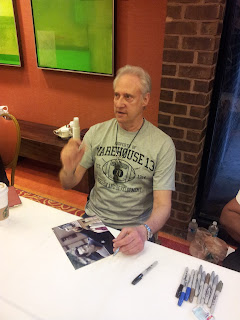An
elderly servant, Cecil Gaines (Whitaker), sits and waits in the White House as
he reminisces about life from his early childhood in the cotton fields of the
South in 1926 where blacks are treated inhumanely and are subjugated and often murdered. Trained to serve his white masters, he flees
this harsh life and finds refuge and a life serving and catering to wealthy white
clients. Married to his wife, Gloria
(Oprah Winfrey), and father of two sons, he wants to provide for his family in ways
that he never had growing up. One
fateful day, Cecil is offered a remarkable position as a servant to the
President in the White House. Cecil is witness to the Civil Rights changes
amid several Presidential administrations.
As the century turns and the nation elects a black President, it signifies
a turning point for not only the country, but also for Cecil and his family.
Whitaker is a
marvel at becoming his character and making the audience believe in his long,
tumultuous life and physical transformation. Cecil
endures personal and professional hardships by living a dual existence: serving the most powerful leader in the land
without any reaction to politics, and yet, as incendiary news headlines and
events (e.g. segregation, the race riots, Vietnam, and political assassinations)
swirl around him, his devotion to his job comes at the expense of
his family. A subplot involving Cecil’s requests for equal pay and
opportunity has an amusing payoff, and the movie’s final line appropriately belongs
to him. His character does evolve over
time which leads to an emotional moment near the end.
Winfrey
is quite good with a toned down performance as a forgotten wife. There is able support by other cast members
including Cuba Gooding, Jr. and Lenny Kravitz (who is coming into his own as an
actor) as fellow butlers, and Clarence Williams III as a mentor. As the
older son, Louis, David Oyelowo is a standout who excels in a difficult role as
naïve student, Freedom Rider, and later as a revolutionary Black Panther. One of his best scenes is a tense dinner
with his parents where their respective values clash. It is a bit hard to believe, however, that
Louis could be at the center of so many important events including being with
Dr. Martin Luther King, Jr.
The
casting of major actors as the Presidents may on the surface seem like stunt
casting, but for the most part, it works well particularly with James Marsden
as John F. Kennedy and Liev Schreiber as Lyndon B. Johnson. Even Jane Fonda makes an effective Nancy
Reagan. But who thought John Cusack
could portray Richard Nixon convincingly?
Daniels does a very
good job of highlighting important moments and giving enough focus to the struggles
within the Gaines family, but trying to cover this much material in little more
than two hours means short changing scenes and truncating some of the
narrative. Some subplots don’t really pan
out or aren’t given sufficient time to develop like a womanizing neighbor,
Howard (Terrence Howard). In fact, while
the film is well presented on the big screen, it could have worked as a TV
miniseries which would have allowed extended character and plot
development.
The
film is shot and cut in a straight narrative, with no stylish, flamboyant
cinematography here, but well produced with a nice flavor of period songs and
costumes enhanced by a somber music score by Rodrigo Leão. Makeup work is impressive.
Always
interesting and an inspiring story which accomplishes a lot in its running
time, Lee Daniels’ The Butler
(studios fighting over title legalities resulted in the current modified title,)
is a breath of fresh air of legitimate, historical and heartfelt drama amid a
summer awash in action and fantasy. Despite
its long road to secure enough financing from various sources (hence the numerous
producers,) as a final pet project by late producer Laura Ziskin, Oscar
nominations await, and Whitaker and company should be rewarded quite nicely.
***1/2
of **** stars





